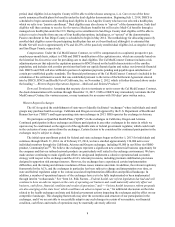Health Net 2013 Annual Report Download - page 20
Download and view the complete annual report
Please find page 20 of the 2013 Health Net annual report below. You can navigate through the pages in the report by either clicking on the pages listed below, or by using the keyword search tool below to find specific information within the annual report.18
requirement against a non-profit organization, and is scheduled to hear arguments on a case involving for-profit
organizations in March 2014.
In addition, legislative changes to the ACA have been suggested or introduced, such as with respect to delaying
the collection of reinsurance fees, delaying implementation of the individual mandate, or delaying or repealing the tax
on medical devices, although none of these provisions have been enacted. Further adding to the uncertainty of the
healthcare reform arena is the delayed implementation of certain ACA requirements by federal regulators, including the
requirement that large employers provide coverage to full-time employees or pay a penalty, along with related reporting
requirements, and the requirement that federal and state small business health option program exchanges be able to
facilitate employee choice among multiple health plans, due to operational concerns impacting both employers and
health insurance issuers.
We and other health insurance companies face uncertainty and execution risk due to the multiple, complex ACA
implementations that are required in abbreviated time frames in new markets. Additionally, in many cases, our
operational and strategic initiatives must be implemented in evolving regulatory environments and without the benefit
of established market data. For example, CMS announced in November 2013 that it would not consider certain health
plans in the individual and small group markets out of compliance with the ACA’s market reform requirements even if
such requirements did not otherwise meet certain requirements, and encouraged relevant state regulators to adopt a
similar transitional policy. Although the states in which we operate have not generally adopted such a transitional
policy, states such as Arizona and California have allowed “early renewals”, whereby a plan is renewed for a policy
year beginning in 2013 and extending into 2014. Such early renewals or other state or federal action that allows non-
compliant plans to extend into 2014 and beyond may adversely impact the risk profile of the exchange population and
result in adverse selection for QHPs, undermine the assumptions on which we based our 2014 premiums, and lead to
uncertainty in our ability to predict costs and set premiums in future years.
In addition, the lack of operating experience in these new marketplaces for insurers and, in certain cases,
providers and consumers, increases the likelihood of a dynamic marketplace that may require us to adjust our operating
and strategic initiatives over time, and there is no assurance that insurers, including us, will be able to do so
successfully. Our execution risk encapsulates, among other things, our simultaneous participation in the exchanges,
Medicaid expansion and the CCI, as described under the heading “Segment Information—Western Region Operations
—California Coordinated Care Initiative” above. These initiatives will require us to effectively incorporate new and
expanded populations and, among other things, will require us to effectively and efficiently restructure our provider
network to, among other things, meet the ACA’s dynamic environment. Any delay or failure by us to execute our
operational and strategic initiatives with respect to health care reform or otherwise appropriately react to the legislation,
implementing regulations, actions of our competitors and the changing marketplace could result in operational
disruptions, disputes with our providers or members, increased exposure to litigation, regulatory issues, damage to our
existing or potential member relationships or other adverse consequences.
Due to the magnitude, scope, complexity and remaining uncertainties of the ACA, including the continuing
modification and interpretation of the ACA rules and the operational risks involved with simultaneous implementation
of multiple initiatives in new markets without established market data, we cannot predict the ultimate impact on our
business of future regulations and laws, including state laws, implementing the ACA. Depending in part on its ultimate
requirements, the ACA could have a material adverse effect on our business, financial condition, cash flows and results
of operations.
Other Federal Laws and Regulation
Medicare Legislation and Regulation. Comprehensive legislation, specifically Title XVIII of the Social Security
Act of 1935, as amended, governs our Medicare program. In addition, our Medicare contracts are subject to regulation
by CMS. CMS has the right to audit Medicare contractors and the health care providers and administrative contractors
who provide certain services on their behalf to determine the quality of care being rendered and the degree of
compliance with CMS' contracts and regulations.
See “—Segment Information—Western Region Operations—Medicare Products” for more information on our
Medicare business and see “Item 1A. Risk Factors—Federal and state audits, reviews and investigations of us and our
subsidiaries could have a material adverse effect on our operations, financial condition and cash flows” for a
description of certain regulatory risks associated with our Medicare business.
Medicaid and Related Legislation. Federal law has also implemented other health programs that are partially
funded by the federal government, such as the Medicaid program (known as Medi-Cal in California). Our Medicaid
programs are regulated and administered in California by the DHCS and in Arizona by AHCCCS. Federal funding
























